Unit 10 You' re supposed to shake hands. Section A 练习题(无答案)人教版英语九年级全册
文档属性
| 名称 | Unit 10 You' re supposed to shake hands. Section A 练习题(无答案)人教版英语九年级全册 |
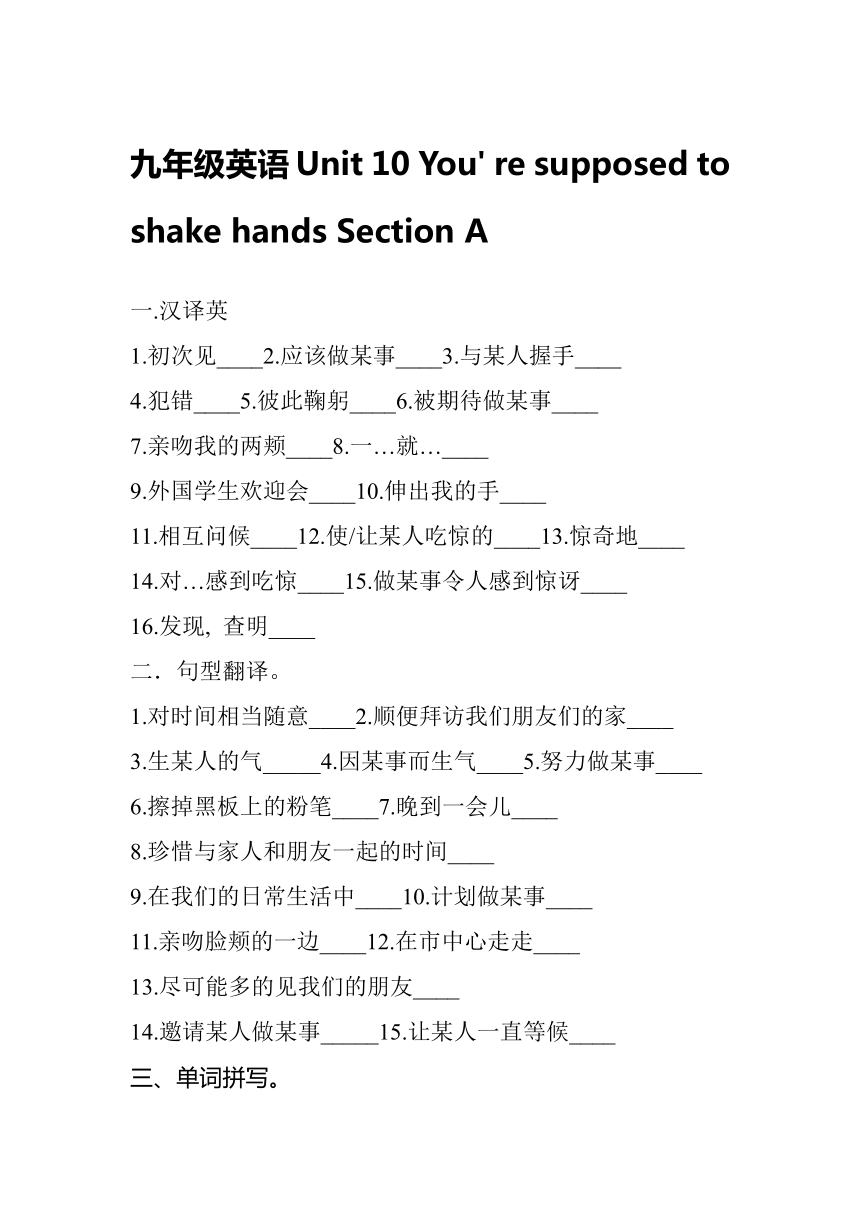
|
|
| 格式 | docx | ||
| 文件大小 | 27.9KB | ||
| 资源类型 | 教案 | ||
| 版本资源 | 人教新目标(Go for it)版 | ||
| 科目 | 英语 | ||
| 更新时间 | 2025-01-01 14:58:38 | ||
图片预览

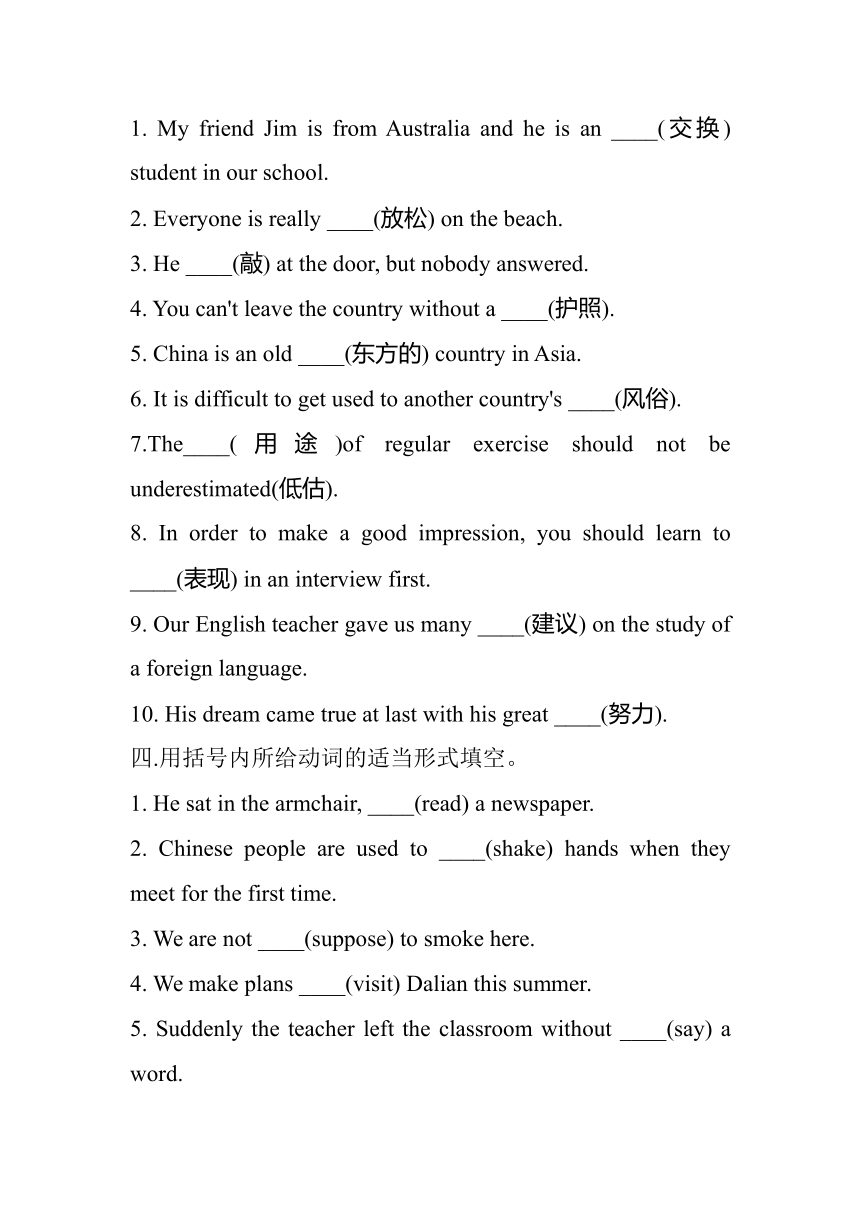
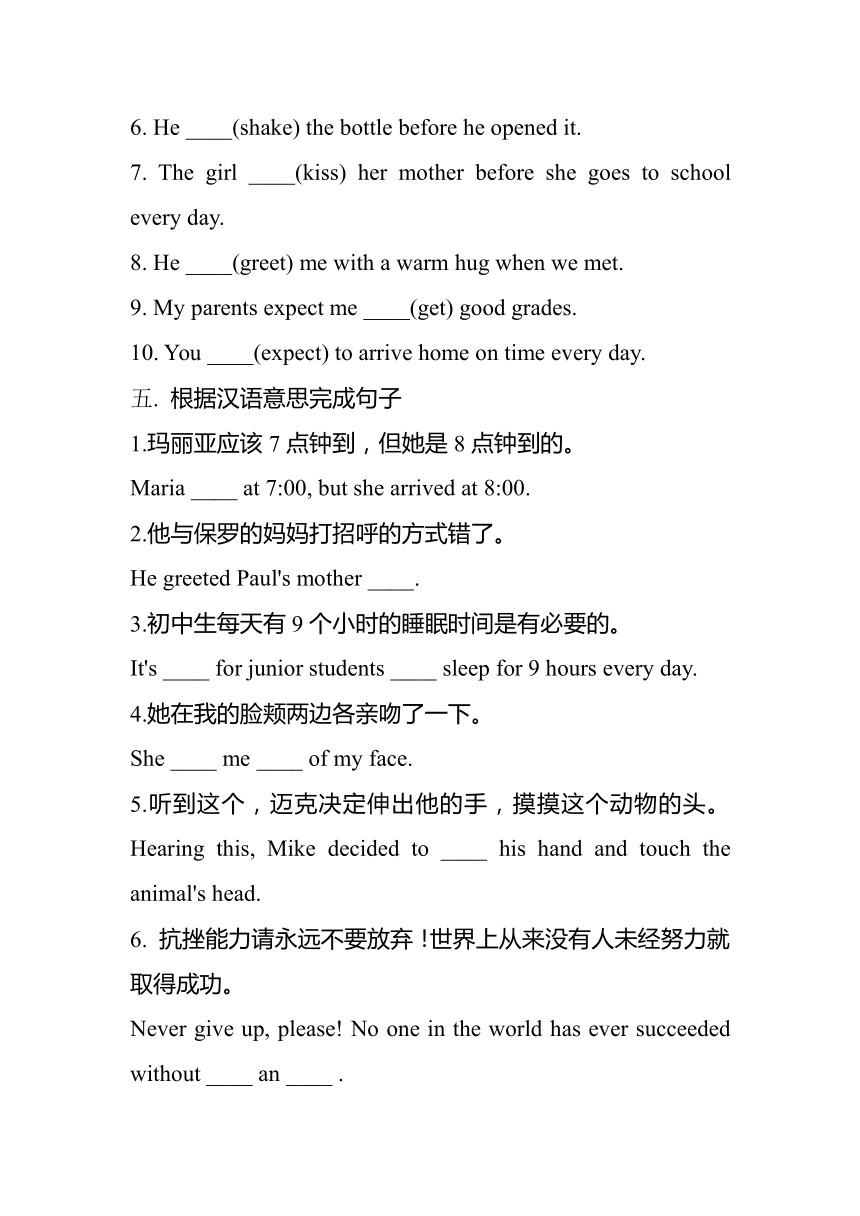
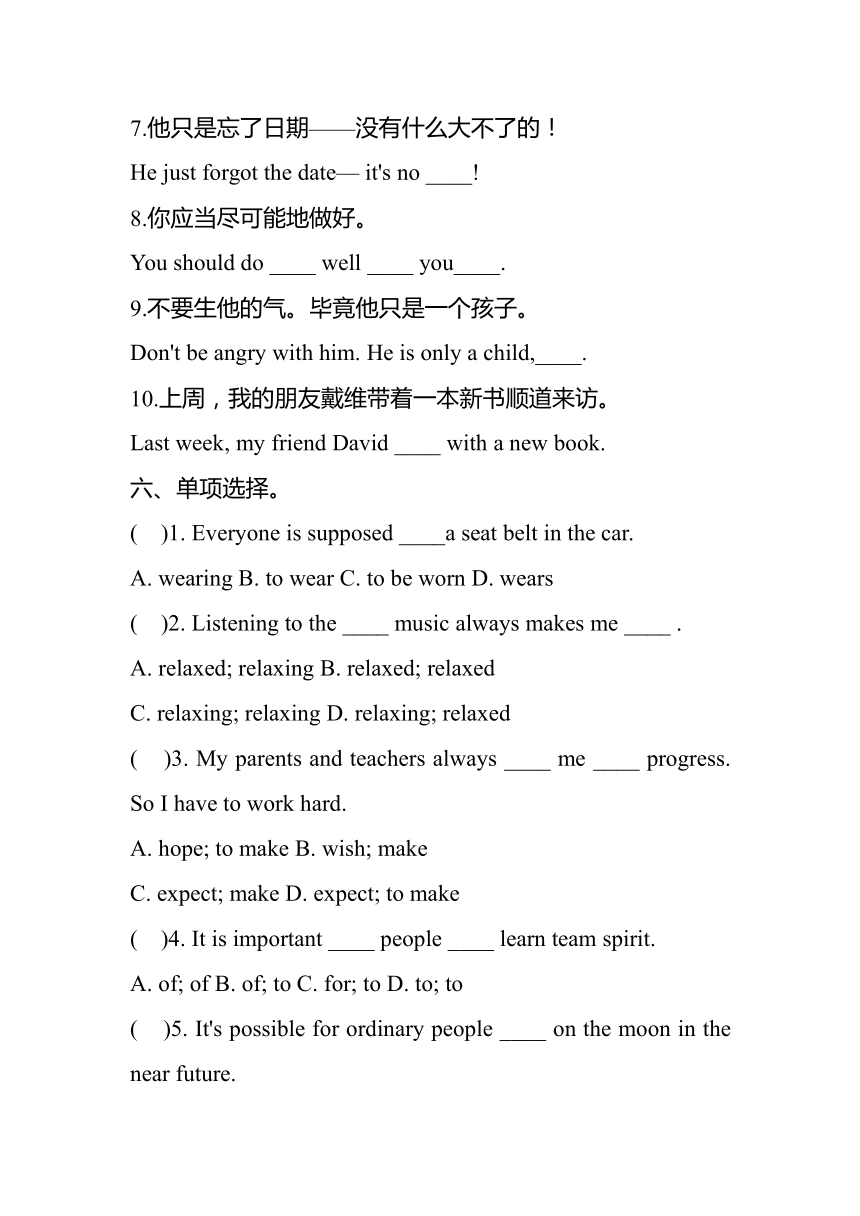
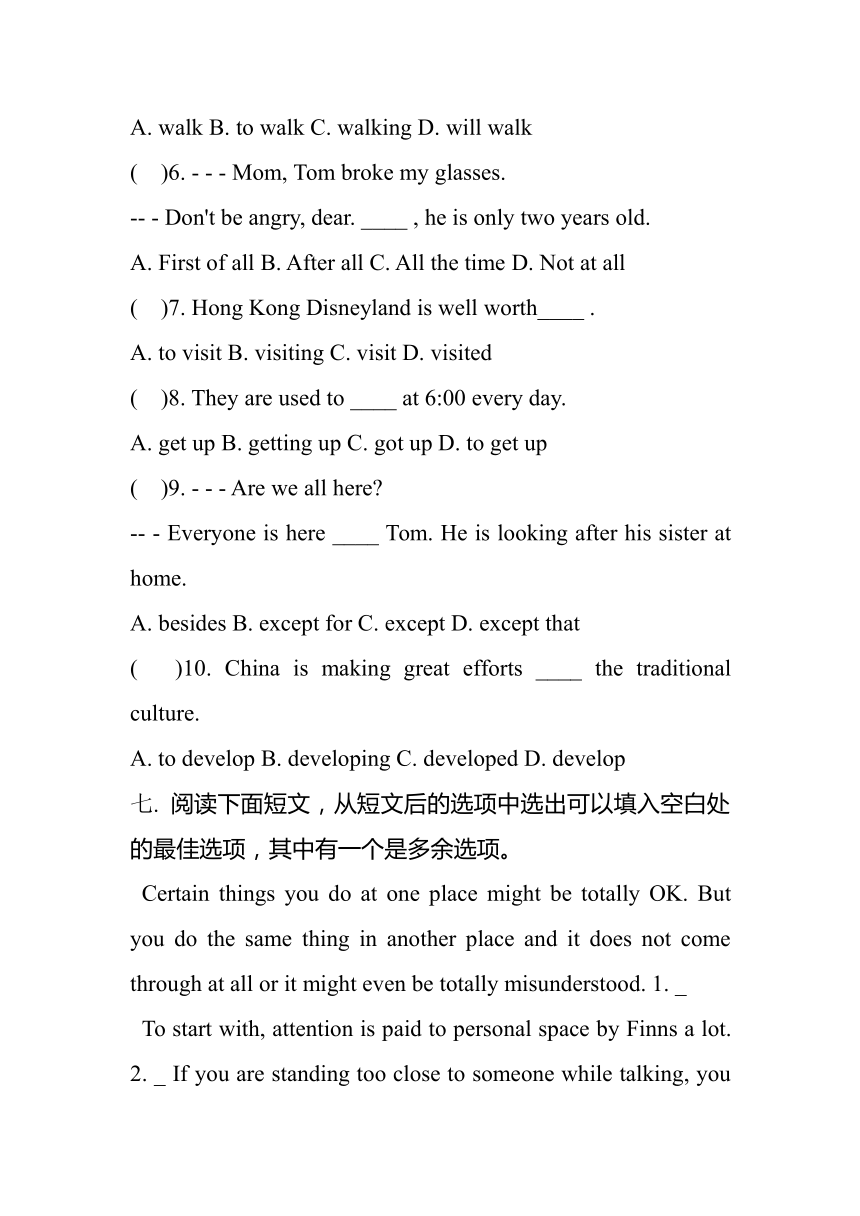
文档简介
九年级英语Unit 10 You' re supposed to shake hands Section A
一.汉译英
1.初次见____2.应该做某事____3.与某人握手____
4.犯错____5.彼此鞠躬____6.被期待做某事____
7.亲吻我的两颊____8.一…就…____
9.外国学生欢迎会____10.伸出我的手____
11.相互问候____12.使/让某人吃惊的____13.惊奇地____
14.对…感到吃惊____15.做某事令人感到惊讶____
16.发现, 查明____
二.句型翻译。
1.对时间相当随意____2.顺便拜访我们朋友们的家____
3.生某人的气_____4.因某事而生气____5.努力做某事____
6.擦掉黑板上的粉笔____7.晚到一会儿____
8.珍惜与家人和朋友一起的时间____
9.在我们的日常生活中____10.计划做某事____
11.亲吻脸颊的一边____12.在市中心走走____
13.尽可能多的见我们的朋友____
14.邀请某人做某事_____15.让某人一直等候____
三、单词拼写。
1. My friend Jim is from Australia and he is an ____(交换) student in our school.
2. Everyone is really ____(放松) on the beach.
3. He ____(敲) at the door, but nobody answered.
4. You can't leave the country without a ____(护照).
5. China is an old ____(东方的) country in Asia.
6. It is difficult to get used to another country's ____(风俗).
7.The____(用途)of regular exercise should not be underestimated(低估).
8. In order to make a good impression, you should learn to ____(表现) in an interview first.
9. Our English teacher gave us many ____(建议) on the study of a foreign language.
10. His dream came true at last with his great ____(努力).
四.用括号内所给动词的适当形式填空。
1. He sat in the armchair, ____(read) a newspaper.
2. Chinese people are used to ____(shake) hands when they meet for the first time.
3. We are not ____(suppose) to smoke here.
4. We make plans ____(visit) Dalian this summer.
5. Suddenly the teacher left the classroom without ____(say) a word.
6. He ____(shake) the bottle before he opened it.
7. The girl ____(kiss) her mother before she goes to school every day.
8. He ____(greet) me with a warm hug when we met.
9. My parents expect me ____(get) good grades.
10. You ____(expect) to arrive home on time every day.
五. 根据汉语意思完成句子
1.玛丽亚应该7点钟到,但她是8点钟到的。
Maria ____ at 7:00, but she arrived at 8:00.
2.他与保罗的妈妈打招呼的方式错了。
He greeted Paul's mother ____.
3.初中生每天有9个小时的睡眠时间是有必要的。
It's ____ for junior students ____ sleep for 9 hours every day.
4.她在我的脸颊两边各亲吻了一下。
She ____ me ____ of my face.
5.听到这个,迈克决定伸出他的手,摸摸这个动物的头。 Hearing this, Mike decided to ____ his hand and touch the animal's head.
6. 抗挫能力请永远不要放弃!世界上从来没有人未经努力就取得成功。
Never give up, please! No one in the world has ever succeeded without ____ an ____ .
7.他只是忘了日期——没有什么大不了的!
He just forgot the date— it's no ____!
8.你应当尽可能地做好。
You should do ____ well ____ you____.
9.不要生他的气。毕竟他只是一个孩子。
Don't be angry with him. He is only a child,____.
10.上周,我的朋友戴维带着一本新书顺道来访。
Last week, my friend David ____ with a new book.
六、单项选择。
( )1. Everyone is supposed ____a seat belt in the car.
A. wearing B. to wear C. to be worn D. wears
( )2. Listening to the ____ music always makes me ____ .
A. relaxed; relaxing B. relaxed; relaxed
C. relaxing; relaxing D. relaxing; relaxed
( )3. My parents and teachers always ____ me ____ progress. So I have to work hard.
A. hope; to make B. wish; make
C. expect; make D. expect; to make
( )4. It is important ____ people ____ learn team spirit.
A. of; of B. of; to C. for; to D. to; to
( )5. It's possible for ordinary people ____ on the moon in the near future.
A. walk B. to walk C. walking D. will walk
( )6. - - - Mom, Tom broke my glasses.
-- - Don't be angry, dear. ____ , he is only two years old.
A. First of all B. After all C. All the time D. Not at all
( )7. Hong Kong Disneyland is well worth____ .
A. to visit B. visiting C. visit D. visited
( )8. They are used to ____ at 6:00 every day.
A. get up B. getting up C. got up D. to get up
( )9. - - - Are we all here
-- - Everyone is here ____ Tom. He is looking after his sister at home.
A. besides B. except for C. except D. except that
( )10. China is making great efforts ____ the traditional culture.
to develop B. developing C. developed D. develop
七. 阅读下面短文,从短文后的选项中选出可以填入空白处的最佳选项,其中有一个是多余选项。
Certain things you do at one place might be totally OK. But you do the same thing in another place and it does not come through at all or it might even be totally misunderstood. 1. _
To start with, attention is paid to personal space by Finns a lot. 2. _ If you are standing too close to someone while talking, you will notice that the other person is trying to get a bit further away from you.
Second, do not make eye contact with Finns. For them, eye contact is not very common, even when talking to friends and family. It might be a. sign of rudeness in other cultures not to look each other in the eye when talking. 3. _
Also, touching strangers in Finland is not allowed. They might feel uncomfortable. For most Finns, physical contact while talking even among friends is not common. They do not give kisses on the cheek when greeting each other. Mostly the greeting is saying hi or shaking hands.
Finns do not talk about their salaries and it is very impolite to ask even friends about how much they earn. 4. _ No one comments about each other's appearance or clothes unless someone asks for an opinion.
Because of all these, Finns are often considered unfriendly. Anyway, as the saying goes, “When in Rome, do as the Romans do.” If you travel to Finland one day, remember these rules.
A. We usually plan to do something interesting together.
B. In Finland it is simply just the opposite.
C. When waiting in line, they keep one meter or more from each other.
D. Here are some rules you should know about when you arein Finland.
E. It is simply considered a part of their personal space.
八. 阅读下面短文,在空白处填入1个适当的单词或括号内单词的正确形式
Last month, I went to meet my friend 1. _(name) Teresa in Columbia. I went to her home. I wanted to shake her 2. _(mother) hand, but she gave me 3. _ kiss. Teresa told me they were 4. _(relax) about time. They can arrive a bit late for meeting someone. They like to stay 5. _ family and friends. I felt very pleased with Teresa and her family. They made me 6. _(feel) at home. During my stay at her home, the food was so delicious 7. _ I ate too much and felt too full. I was used to 8. _(eat) with chopsticks and a spoon. But I learned to use a knife and fork. In my free time, I often sat beside Teresa, reading books and talking about something with 9. _(she). Often she took me just to walk around the city center, 10. _(meet) many of her friends.
九、完形填空。
The word "kimono "means something to wear. The kimono is a kind of Japanese traditional clothes. It has a long history and _1_ the culture of Japan and the life of Japanese.
There' re many _2_ types of kimonos for men, women and children in Japan. People wear the kimono according to(按照)_3_ one's age, the season, the event, but also one's marriage. Young unmarried women wear kimonos with long sleeves(袖子). These kimonos are colorful and have many patterns(图案), while married women or elder women wear kimonos with _4_ sleeves. Men wore kimonos as daily clothes in the _5_ , but today Japanese usually wear kimonos for festivals, ceremonies(典礼) and _6_ occasions. A child's kimono is _7_ very colorful, just like a woman's kimono.
Today, a Japanese woman usually _8_ only one kimono. She wears it for the coming of the age ceremony on her 19th birthday. Most Japanese have to _9_ kimonos for weddings(婚礼). Today they seldom wear kimonos _10_ everyday clothes. Sometimes, if you go to a small town or village in Japan, you may see elders wearing kimonos luckily.
( )1. A. calls B. explains C. says D. shows
( )2. A. similar B. different C. new D. useful
( )3. A. not only B. not just C. both D. between
( )4. A. heavy B. beautiful C. short D. warm
( )5. A. city B. work C. past D. house
( )6.A.common B. special C. quiet D. noisy
( )7. A. usually B. seldom C. never D. once
( )8. A. likes B. washes C. has D. sends
( )9. A. keep B. rent C. make D. lend
( )10. A. without B. inside C. as D. over
十. 阅读理解。
A
Different countries have different customs and cultures. Every culture around the world has different customs and ways of communicating. When you learn a language, you learn more than words.
In China, people are used to saying “sorry” to show that they regret doing something wrong. But it's very proud for American people to have polite manners towards one another in public. They often use the word “sorry”— even when they don't really mean it! Usually, if they want to ask a stranger for the time, they will start by saying “Sorry to trouble you.” If they' re five minutes late for the appointment, they will greet the person by saying “Sorry, I'm late!” It's quite different in China. They use the word “sorry” in so many different situations that the meaning of the word has changed a little over time. The two main dictionary definitions(定义) of “sorry” are: 1) feeling sad for someone else because of their problems or bad luck; 2) feeling regret because you' ve done something wrong.
109So what does “sorry” really mean And why do Western people use it so much Well, in Western culture, saying “sorry” is a way to be polite. It's also a very clever way to get what they want. If you want to borrow something from others, you'd better say “sorry” to them about something. Or it's hard for you to get what you want. So maybe saying “sorry” is not only just being polite, but also a good method to get what you want!
( )1. How many examples of the use of “sorry” by Americans are given in the second paragraph
A. Two. B. Three. C. Four.
( )2. What does the underlined word “appointment” in the passage mean
A. Idea. B. Class. C. Date.
( )3. In which country do people say “sorry” to get what they want
A. Japan. B. China. C. Germany.
( )4. What's the best title of the passage
A. How to Say “Sorry” Correctly
B. The Different Meanings of “Sorry”
C. Why Western People Say “Sorry”
B
On April 18, the 100-day countdown to the 2012 Olympic Games in London began. For this year's Games' slogan, the London Organizing Committee of the Olympic Games has chosen the phrase “Inspire a Generation”(激励一代人). It is expected to inspire athletes(运动员) to do their best, and common people to do better in their daily lives.
The Games are also inspiring lots of tourists to come to London. But if you go there, you'd better try your best to follow British manners and customs. Otherwise, you' ll end up in a right mess! Expert William Hanson has given the Associate Press a few tips for tourists on how to act while in the UK. Let's have a look: Don't talk about money. According to Hanson, British people hate talking about money and it is considered rude to do so. In particular, never ask anyone about their salary.
Afternoon tea. The traditional view of the British sitting down for an afternoon tea is not exact. Few people keep the tradition nowadays.
Give tips— but not in an obvious way. The British favor a quiet “thank you” gift for good service rather than the rigid 16-20% tip Americans always give. In fact, many British waiters will not feel anxious and nervous if you decide not to tip at all.
Greeting with a kiss. The British are not like their passionate neighbors in France. Many handshake or a pat on the back to say “hello”.
Conversation tip. If you want to be friendly, end a sentence with the word “mate”.
( )5. The underlined word “It” in the first paragraph refers to ____ .
A. London
B. “Inspire a Generation"
C. The 100-day countdown
D. The London Organizing Committee
( )6. British people think it rude to ____ .
A. have tea in the early morning B. ask others about their salary
C. give a 10% tip to a waiter D. shake hands with friends
( )7. The underlined word “passionate” in the passage means“____” in Chinese.
A.冷酷的 B.羞涩的 C.有激情的 D.聪明的
( )8. When will the London Olympics be held
A. On August 18
B. At the end of July
C. At the beginning of August
D. In the middle of July
一.汉译英
1.初次见____2.应该做某事____3.与某人握手____
4.犯错____5.彼此鞠躬____6.被期待做某事____
7.亲吻我的两颊____8.一…就…____
9.外国学生欢迎会____10.伸出我的手____
11.相互问候____12.使/让某人吃惊的____13.惊奇地____
14.对…感到吃惊____15.做某事令人感到惊讶____
16.发现, 查明____
二.句型翻译。
1.对时间相当随意____2.顺便拜访我们朋友们的家____
3.生某人的气_____4.因某事而生气____5.努力做某事____
6.擦掉黑板上的粉笔____7.晚到一会儿____
8.珍惜与家人和朋友一起的时间____
9.在我们的日常生活中____10.计划做某事____
11.亲吻脸颊的一边____12.在市中心走走____
13.尽可能多的见我们的朋友____
14.邀请某人做某事_____15.让某人一直等候____
三、单词拼写。
1. My friend Jim is from Australia and he is an ____(交换) student in our school.
2. Everyone is really ____(放松) on the beach.
3. He ____(敲) at the door, but nobody answered.
4. You can't leave the country without a ____(护照).
5. China is an old ____(东方的) country in Asia.
6. It is difficult to get used to another country's ____(风俗).
7.The____(用途)of regular exercise should not be underestimated(低估).
8. In order to make a good impression, you should learn to ____(表现) in an interview first.
9. Our English teacher gave us many ____(建议) on the study of a foreign language.
10. His dream came true at last with his great ____(努力).
四.用括号内所给动词的适当形式填空。
1. He sat in the armchair, ____(read) a newspaper.
2. Chinese people are used to ____(shake) hands when they meet for the first time.
3. We are not ____(suppose) to smoke here.
4. We make plans ____(visit) Dalian this summer.
5. Suddenly the teacher left the classroom without ____(say) a word.
6. He ____(shake) the bottle before he opened it.
7. The girl ____(kiss) her mother before she goes to school every day.
8. He ____(greet) me with a warm hug when we met.
9. My parents expect me ____(get) good grades.
10. You ____(expect) to arrive home on time every day.
五. 根据汉语意思完成句子
1.玛丽亚应该7点钟到,但她是8点钟到的。
Maria ____ at 7:00, but she arrived at 8:00.
2.他与保罗的妈妈打招呼的方式错了。
He greeted Paul's mother ____.
3.初中生每天有9个小时的睡眠时间是有必要的。
It's ____ for junior students ____ sleep for 9 hours every day.
4.她在我的脸颊两边各亲吻了一下。
She ____ me ____ of my face.
5.听到这个,迈克决定伸出他的手,摸摸这个动物的头。 Hearing this, Mike decided to ____ his hand and touch the animal's head.
6. 抗挫能力请永远不要放弃!世界上从来没有人未经努力就取得成功。
Never give up, please! No one in the world has ever succeeded without ____ an ____ .
7.他只是忘了日期——没有什么大不了的!
He just forgot the date— it's no ____!
8.你应当尽可能地做好。
You should do ____ well ____ you____.
9.不要生他的气。毕竟他只是一个孩子。
Don't be angry with him. He is only a child,____.
10.上周,我的朋友戴维带着一本新书顺道来访。
Last week, my friend David ____ with a new book.
六、单项选择。
( )1. Everyone is supposed ____a seat belt in the car.
A. wearing B. to wear C. to be worn D. wears
( )2. Listening to the ____ music always makes me ____ .
A. relaxed; relaxing B. relaxed; relaxed
C. relaxing; relaxing D. relaxing; relaxed
( )3. My parents and teachers always ____ me ____ progress. So I have to work hard.
A. hope; to make B. wish; make
C. expect; make D. expect; to make
( )4. It is important ____ people ____ learn team spirit.
A. of; of B. of; to C. for; to D. to; to
( )5. It's possible for ordinary people ____ on the moon in the near future.
A. walk B. to walk C. walking D. will walk
( )6. - - - Mom, Tom broke my glasses.
-- - Don't be angry, dear. ____ , he is only two years old.
A. First of all B. After all C. All the time D. Not at all
( )7. Hong Kong Disneyland is well worth____ .
A. to visit B. visiting C. visit D. visited
( )8. They are used to ____ at 6:00 every day.
A. get up B. getting up C. got up D. to get up
( )9. - - - Are we all here
-- - Everyone is here ____ Tom. He is looking after his sister at home.
A. besides B. except for C. except D. except that
( )10. China is making great efforts ____ the traditional culture.
to develop B. developing C. developed D. develop
七. 阅读下面短文,从短文后的选项中选出可以填入空白处的最佳选项,其中有一个是多余选项。
Certain things you do at one place might be totally OK. But you do the same thing in another place and it does not come through at all or it might even be totally misunderstood. 1. _
To start with, attention is paid to personal space by Finns a lot. 2. _ If you are standing too close to someone while talking, you will notice that the other person is trying to get a bit further away from you.
Second, do not make eye contact with Finns. For them, eye contact is not very common, even when talking to friends and family. It might be a. sign of rudeness in other cultures not to look each other in the eye when talking. 3. _
Also, touching strangers in Finland is not allowed. They might feel uncomfortable. For most Finns, physical contact while talking even among friends is not common. They do not give kisses on the cheek when greeting each other. Mostly the greeting is saying hi or shaking hands.
Finns do not talk about their salaries and it is very impolite to ask even friends about how much they earn. 4. _ No one comments about each other's appearance or clothes unless someone asks for an opinion.
Because of all these, Finns are often considered unfriendly. Anyway, as the saying goes, “When in Rome, do as the Romans do.” If you travel to Finland one day, remember these rules.
A. We usually plan to do something interesting together.
B. In Finland it is simply just the opposite.
C. When waiting in line, they keep one meter or more from each other.
D. Here are some rules you should know about when you arein Finland.
E. It is simply considered a part of their personal space.
八. 阅读下面短文,在空白处填入1个适当的单词或括号内单词的正确形式
Last month, I went to meet my friend 1. _(name) Teresa in Columbia. I went to her home. I wanted to shake her 2. _(mother) hand, but she gave me 3. _ kiss. Teresa told me they were 4. _(relax) about time. They can arrive a bit late for meeting someone. They like to stay 5. _ family and friends. I felt very pleased with Teresa and her family. They made me 6. _(feel) at home. During my stay at her home, the food was so delicious 7. _ I ate too much and felt too full. I was used to 8. _(eat) with chopsticks and a spoon. But I learned to use a knife and fork. In my free time, I often sat beside Teresa, reading books and talking about something with 9. _(she). Often she took me just to walk around the city center, 10. _(meet) many of her friends.
九、完形填空。
The word "kimono "means something to wear. The kimono is a kind of Japanese traditional clothes. It has a long history and _1_ the culture of Japan and the life of Japanese.
There' re many _2_ types of kimonos for men, women and children in Japan. People wear the kimono according to(按照)_3_ one's age, the season, the event, but also one's marriage. Young unmarried women wear kimonos with long sleeves(袖子). These kimonos are colorful and have many patterns(图案), while married women or elder women wear kimonos with _4_ sleeves. Men wore kimonos as daily clothes in the _5_ , but today Japanese usually wear kimonos for festivals, ceremonies(典礼) and _6_ occasions. A child's kimono is _7_ very colorful, just like a woman's kimono.
Today, a Japanese woman usually _8_ only one kimono. She wears it for the coming of the age ceremony on her 19th birthday. Most Japanese have to _9_ kimonos for weddings(婚礼). Today they seldom wear kimonos _10_ everyday clothes. Sometimes, if you go to a small town or village in Japan, you may see elders wearing kimonos luckily.
( )1. A. calls B. explains C. says D. shows
( )2. A. similar B. different C. new D. useful
( )3. A. not only B. not just C. both D. between
( )4. A. heavy B. beautiful C. short D. warm
( )5. A. city B. work C. past D. house
( )6.A.common B. special C. quiet D. noisy
( )7. A. usually B. seldom C. never D. once
( )8. A. likes B. washes C. has D. sends
( )9. A. keep B. rent C. make D. lend
( )10. A. without B. inside C. as D. over
十. 阅读理解。
A
Different countries have different customs and cultures. Every culture around the world has different customs and ways of communicating. When you learn a language, you learn more than words.
In China, people are used to saying “sorry” to show that they regret doing something wrong. But it's very proud for American people to have polite manners towards one another in public. They often use the word “sorry”— even when they don't really mean it! Usually, if they want to ask a stranger for the time, they will start by saying “Sorry to trouble you.” If they' re five minutes late for the appointment, they will greet the person by saying “Sorry, I'm late!” It's quite different in China. They use the word “sorry” in so many different situations that the meaning of the word has changed a little over time. The two main dictionary definitions(定义) of “sorry” are: 1) feeling sad for someone else because of their problems or bad luck; 2) feeling regret because you' ve done something wrong.
109So what does “sorry” really mean And why do Western people use it so much Well, in Western culture, saying “sorry” is a way to be polite. It's also a very clever way to get what they want. If you want to borrow something from others, you'd better say “sorry” to them about something. Or it's hard for you to get what you want. So maybe saying “sorry” is not only just being polite, but also a good method to get what you want!
( )1. How many examples of the use of “sorry” by Americans are given in the second paragraph
A. Two. B. Three. C. Four.
( )2. What does the underlined word “appointment” in the passage mean
A. Idea. B. Class. C. Date.
( )3. In which country do people say “sorry” to get what they want
A. Japan. B. China. C. Germany.
( )4. What's the best title of the passage
A. How to Say “Sorry” Correctly
B. The Different Meanings of “Sorry”
C. Why Western People Say “Sorry”
B
On April 18, the 100-day countdown to the 2012 Olympic Games in London began. For this year's Games' slogan, the London Organizing Committee of the Olympic Games has chosen the phrase “Inspire a Generation”(激励一代人). It is expected to inspire athletes(运动员) to do their best, and common people to do better in their daily lives.
The Games are also inspiring lots of tourists to come to London. But if you go there, you'd better try your best to follow British manners and customs. Otherwise, you' ll end up in a right mess! Expert William Hanson has given the Associate Press a few tips for tourists on how to act while in the UK. Let's have a look: Don't talk about money. According to Hanson, British people hate talking about money and it is considered rude to do so. In particular, never ask anyone about their salary.
Afternoon tea. The traditional view of the British sitting down for an afternoon tea is not exact. Few people keep the tradition nowadays.
Give tips— but not in an obvious way. The British favor a quiet “thank you” gift for good service rather than the rigid 16-20% tip Americans always give. In fact, many British waiters will not feel anxious and nervous if you decide not to tip at all.
Greeting with a kiss. The British are not like their passionate neighbors in France. Many handshake or a pat on the back to say “hello”.
Conversation tip. If you want to be friendly, end a sentence with the word “mate”.
( )5. The underlined word “It” in the first paragraph refers to ____ .
A. London
B. “Inspire a Generation"
C. The 100-day countdown
D. The London Organizing Committee
( )6. British people think it rude to ____ .
A. have tea in the early morning B. ask others about their salary
C. give a 10% tip to a waiter D. shake hands with friends
( )7. The underlined word “passionate” in the passage means“____” in Chinese.
A.冷酷的 B.羞涩的 C.有激情的 D.聪明的
( )8. When will the London Olympics be held
A. On August 18
B. At the end of July
C. At the beginning of August
D. In the middle of July
同课章节目录
- Unit 1 How can we become good learners.
- Section A
- Section B
- Unit 2 I think that mooncakes are delicious!
- Section A
- Section B
- Unit 3 Could you please tell me where the restroom
- Section A
- Section B
- Unit 4 I used to be afraid of the dark.
- Section A
- Section B
- Unit 5 What are the shirts made of?
- Section A
- Section B
- Review of Units 1-5
- Unit 6 When was it invented?
- Section A
- Section B
- Unit 7 Teenagers should be allowed to choose their
- Section A
- Section B
- Unit 8 It must belong to Carla.
- Section A
- Section B
- Unit 9 I like music that I can dance to.
- Section A
- Section B
- Unit 10 You're supposed to shake hands.
- Section A
- Section B
- Review of Units 6-10
- Unit 11 Sad movies make me cry.
- Section A
- Section B
- Unit 12 Life is full of the unexpected
- Section A
- Section B
- Unit 13 We're trying to save the earth!
- Section A
- Section B
- Unit 14 I remember meeting all of you in Grade 7.
- Section A
- Section B
- Review of Units 11-14
